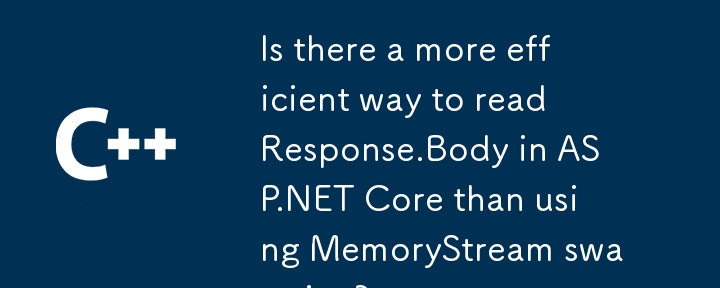
Efficiently Reading ASP.NET Core's Response.Body: Alternatives to MemoryStream Swapping
Accessing Response.Body in ASP.NET Core, a read-only stream, presents a challenge. While swapping it with a MemoryStream is a common workaround, it's not optimal. This article explores more efficient alternatives.

The Problem: Directly reading Response.Body is problematic due to its read-only nature, designed for performance optimization in ASP.NET Core.
The Inefficient Solution (MemoryStream Swapping): The traditional approach involves replacing Response.Body with a MemoryStream, reading the content, and then restoring the original stream. This is resource-intensive and potentially impacts performance.
Better Approaches:
While MemoryStream swapping works, it's not the most efficient method. Consider these alternatives:
Response.Body to a MemoryStream, reads the content, and then restores the original stream. This keeps the stream manipulation logic isolated within the middleware. Here's a simplified example:<code class="language-csharp">public class ResponseRewindMiddleware
{
private readonly RequestDelegate _next;
public ResponseRewindMiddleware(RequestDelegate next)
{
_next = next;
}
public async Task InvokeAsync(HttpContext context)
{
var originalBody = context.Response.Body;
using var memoryStream = new MemoryStream();
context.Response.Body = memoryStream;
await _next(context);
memoryStream.Seek(0, SeekOrigin.Begin);
using var reader = new StreamReader(memoryStream);
string responseBody = await reader.ReadToEndAsync();
memoryStream.Seek(0, SeekOrigin.Begin);
await memoryStream.CopyToAsync(originalBody);
context.Response.Body = originalBody;
}
}</code>Response.Body.Important Considerations:
Response.Body will introduce some performance overhead. Use these techniques judiciously and only when absolutely necessary.try-catch blocks) is crucial to prevent exceptions from disrupting the application.By employing middleware or response caching (when appropriate), you can significantly improve the efficiency of reading Response.Body compared to the direct MemoryStream swapping technique. Remember to carefully weigh the performance implications before implementing these solutions.
The above is the detailed content of Is there a more efficient way to read Response.Body in ASP.NET Core than using MemoryStream swapping?. For more information, please follow other related articles on the PHP Chinese website!




